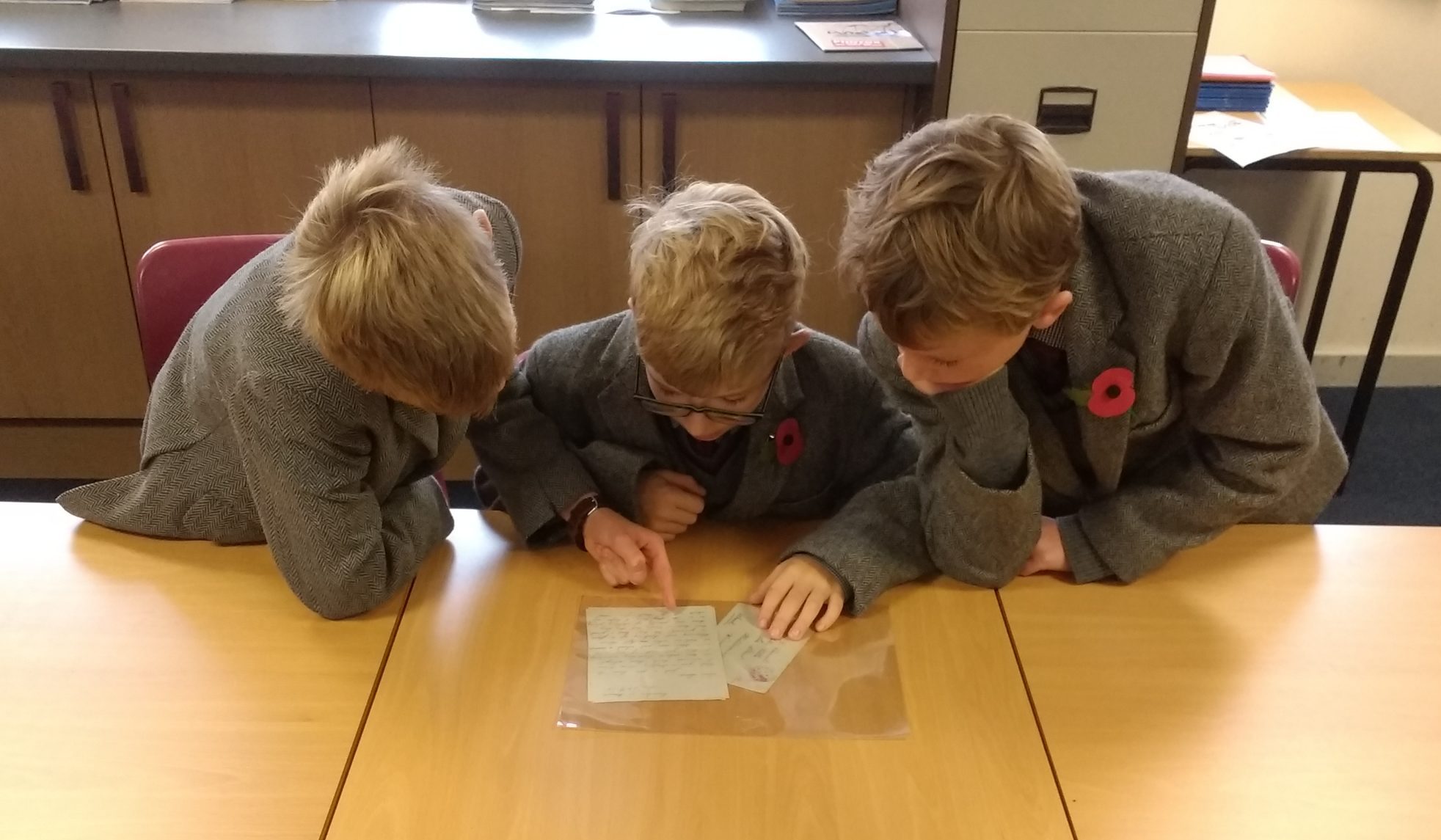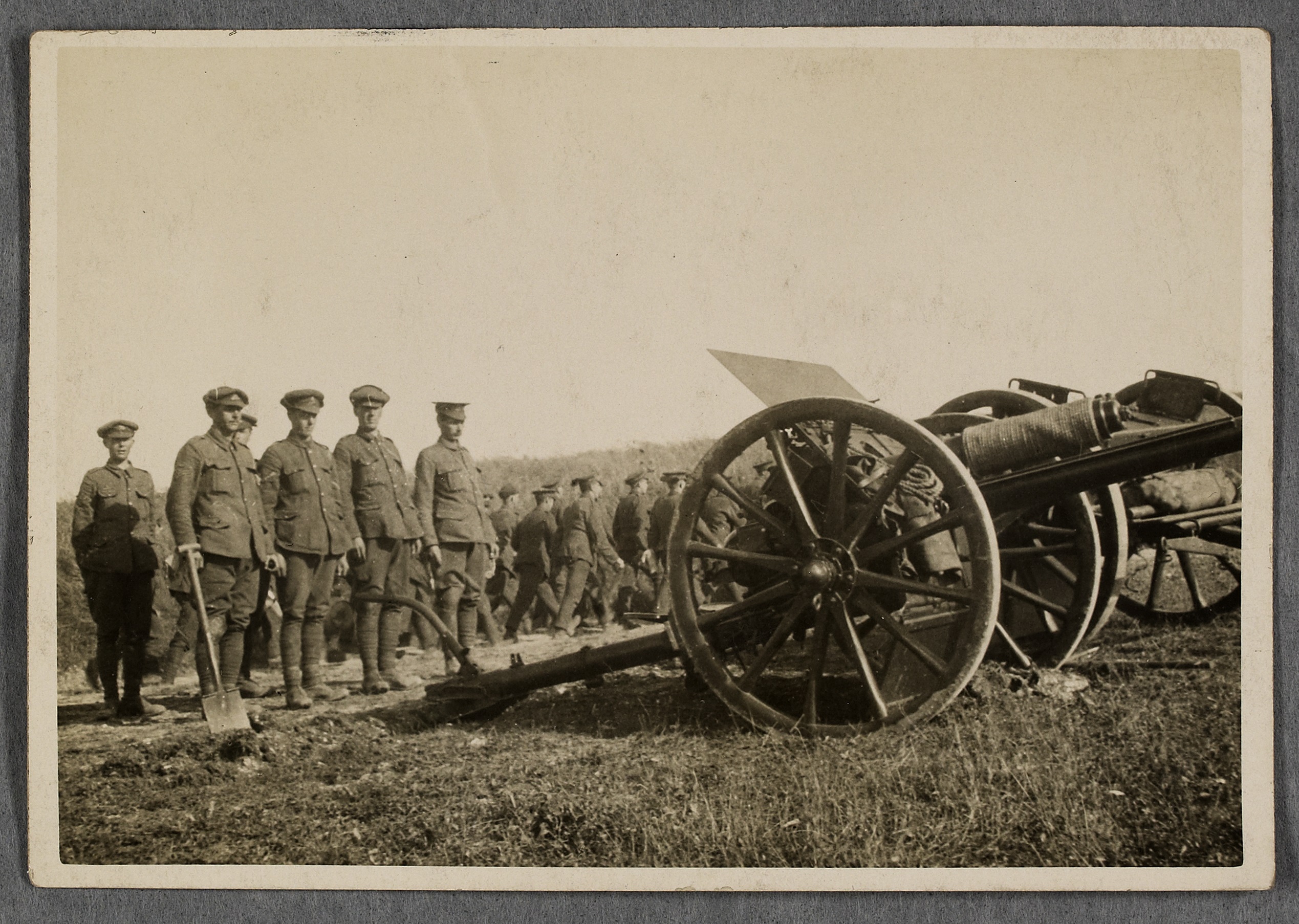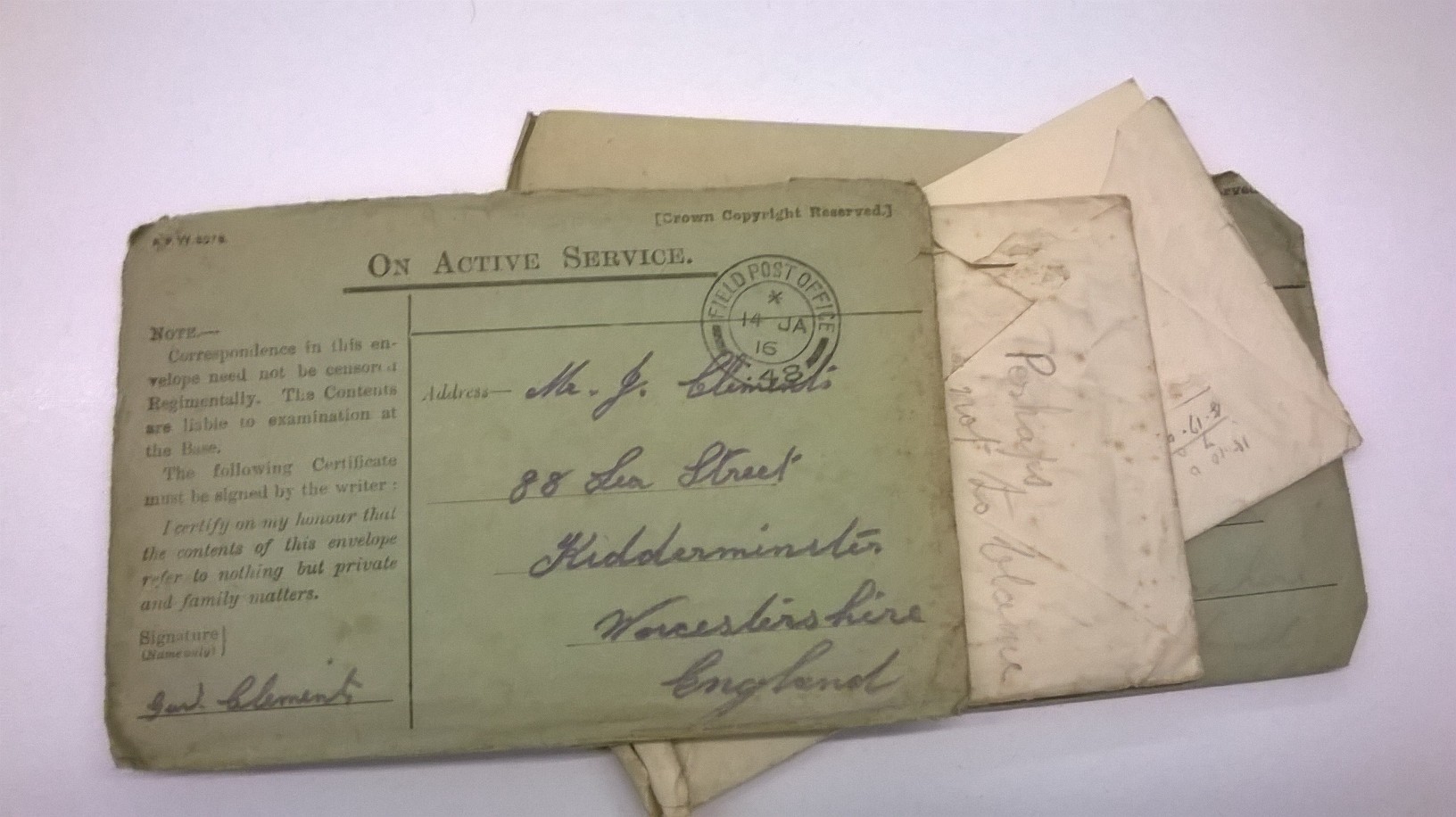WWI Letters Workshop
This is a workshop based on letters in the archives sent by Bert Clements of Kidderminster and Cyril Sladden of Evesham. These were two of the thousands of local men who joined up in WWI. We have delivered this workshop quite a few times with children, using original letters at the start, which provide a great opportunity for children to get close to real items. As part of the Worcestershire World war One Hundred Project we went out to lots of schools in the run up the Remembrance Day 2018. With the current situation schools can’t come to us, and many schools are reluctant to have visits, so we have uploaded these resources to enable you to deliver it yourself in the classroom. Copies of worksheets and images of letters are enclosed. The format of the workshop is below, with potential answers and things to look out for, to enable you to run it in your school. If you’d like us to come to you please get in touch.

Letters provide an insight into people’s experiences. It’s easy to be overwhelmed by the huge number of people involved in the war. Letters zoom down to individuals. Armies are made up of thousands of people, all different, but many have common experiences and emotions. They are a great opportunity of using primary historical sources, and we have video recordings and transcripts to help the children get into the meat of what is being said rather than struggling with handwriting.
Bert was a Kidderminster man who served in WWI in the Royal Artillery, joining on 21 September 1914, around 6 weeks after war was declared. He was born in 1894, living in Lea Street and going to Lea Street School. He did survive the war (it is always strange going through war letters half expecting to come across a telegram at the end sent to a man’s parents). On his return he married Winifred in 1924 and stayed in Kidderminster. After his death his family passed the collection of over 20 letters to the Record Office so that other people could read them.
Cyril Sladden (1890-1974) served with the 9th Battalion Worcestershire Regiment from 1914-1919. From a well to do family, he was an officer, and his two brother also served as officers too.

Photo in among the Bert Clements letters

Bert Clements
What have you got in front of you?
Distribute prints of Bert Clements letters and ask them to see what they can work out
- Handwriting – hard! May be in pencil, what would they use? Where written (some on rifle butts)
- Location – somewhere in France. Did they know where they were (young man from Kidderminster may have no idea of geography around him)? Or secrecy? Or both? We don’t know but both are probable.
- Date – WWI. How did they get back (big logistical task – see BBC article on post if you want to know more)?
- Censor mark – censored by his platoon commander, an officer, so ensure he didn’t say anything he shouldn’t. Would this make any difference to what he wrote do you think? What if the class was asked to write about their school, and told that the Headteacher would see what was written first, would this make a difference to what they write?
- Who are they from and to – To his Dad from Bert, but may be hard to read the names
- Can anyone read any content? It can be hard to read old handwriting. If you spend a little time you can usually read the odd word, then a few more as you get used to it.
What do you know about WWI? Open question to see what they know from lessons or what they know. Some, not surprisingly, may be confused between WWI & WWII as they may see little difference between events 100 and 80 years ago.
How do we know about WWI, what sources help us?
- Letters (only some survive)
- Stories – written down after in books, oral history, family stories passed down (does anyone have family stories?)
- Newspapers – published at time or recent articles looking back
- Books
- Diaries
- Photos
- Archaeology of trenches etc.
- Objects in museums
These are the evidence historians use. Letters are useful. Give someone’s perspective but just one person’s views. May be similar to other people, may be different.
We are Worcestershire Archive & Archaeology Service, have 12 miles of archives in boxes like these. Boxes don’t look interesting but contain stories, which is what people are interested in, such as stories from the front. Real stories about real people. Can be random what has survived. Why might some not survive (thrown away, lost etc.)? We have a few collections of letters including Bert Clements of Kidderminster (not sure if he is on one of the photos).
- what do they contain – [everyday, some detail of front (matter of fact about pencil blown out of hand), ask for or acknowledge parcels, want to be remembered back home]
- what is his mood – [generally fairly positive]
- do you believe him? [Brave face for parents? Aware of officer censoring? Hard to put ourselves in his shoes and inside his mind.]
- Play 2 or 3 clips of the Gunner Clements letter being read. Links to two are below, others can be found on YouTube
Letter summaries for teachers
No. 3
- Somewhere in Belgium
- Got parcel, including chocolate and matches and cigarettes. Always looking for a letter from home.
- Doesn’t fire a gun because he’s a telephonist, which is risky. Have to mend them wires under fire (cut by shells), lies in ditch for 20 mins with bullets around. Star shell. Going into trenches for 4 days (soldiers only on front line for a few days then went to rear lines for a few days so could rest). Sgt Tolly asks to be remembered back home. Observing German guns, telephone back what’s happening.
- See holes made, big as dining room.
- How are things in Kidderminster and Brum (Birmingham)? Success in bowls for his Dad.
- Give love to girls.
No. 7
- I’m still jogging along and going strong like Johnny Walker (whiskey brand?)
- Hot, thinks about a day at home by river.
- Bowls, Dad losing.
- Sgt Tolley wants cricketers to think of them
- How are things at home? How long will it last? Reminisce about Sunday roast and bed. Not seen a bed since been out in France.
- Got something sent out. Gollywog badge sent – today not something we’d do and can be considered offensive – some prases and items considered normal 100 years ago may not be seen as acceptable today.
- “4 big ones come over”, writing in field, a big one (shell) knocked pencil out of hand – how big a blast would that be?
- Give my love to everyone
- Have 2 German fuses he’s collected
Ask for answers, and also anything surprising?
What does Bert talk about in his letters?
His role as a telephonist
Thinking of home – his dad’s bowls team and thinking of what he’d like to do when he goes home eventually. Sending greeting to family and friends, and wanting them to remember him. Letters are as much about home as they are about describing his experiences in France.
Presents and letters – highlights for the men out in France, and looking for gifts to supplement rations and show people are thinking of him
What is his mood? Is he happy, sad, scared?
Seems positive. We expect him to be scared and sad, but his letters don’t show this. He’s thinking of others, and is matter of fact about things including bombs. Wants war to be over though.
Do you think he’s telling the truth?
Don’t know! He may be, and he may be positive. However he may also be putting on a brave face. Does he want his dad to know how he’s feeling. Without asking we don’t know and just have to make an educated guess from reading the letters and from what we know about the war.
Cyril Sladden
Bert is one man out of hundreds of thousands. What’s the problem with using just his letters? He may be an exception or may reflect many others. So we’ll look at another set of letters, Cyril Sladden of Badsey near Evesham, an officer. From a more well to do family and well educated.
Have you heard of Gallipoli? In Turkey. War wasn’t just in France & Flanders, which is what people think of. Worcestershire Regiment served elsewhere too, including Turkey and Iraq. Who knew that?
Read the letters from Cyril (transcribed so don’t need to struggle with handwriting). A-C or all 5 if longer than an hour
- What do they contain – mix including military detail, requests home, lots of flies, and being shot in shoulder
- What is his mood – mixed. Hacked off about flies! Seems matter iof fact about being shot.
- Do you believe him – an officer so censored his own letters, so may tell truth more. Seems to have more emotion and you can tell he’s annoyed at times.
- Any differences from Bert – more emotion? Longer, more military detail. He’s injured.
How useful are letters to a historian?
What have you learnt? Any surprises?
- 11th October 2024
The history of the Sandys family of Ombersley dates back almost 400 years. Ombersley Court – the impressive, listed manor and estate set in the Worcestershire countryside, home to the titled family since 1614 – forms the backdrop to their story; one that is of both local and national interest. When the late Lord Sandys,...
- 9th October 2024
Worcestershire Archive and Archaeology Service secured £73000 in 2022 from The National Archives’ (TNA) New Burdens fund to catalogue and improve access to certain public records under The Public Records Act. The act requires certain public bodies to transfer records of historical value for permanent preservation to their archive services appointed as ‘places of deposit’. Following...
- 14th May 2024
Explore the story behind the human skeleton found buried within an embankment of the Worcester, Bromyard and Leominster Railway line in 2021, close to Riverlands Farm in Leigh, to the west of Worcester. Built in the 1860s, the line eventually closed in the 1960s, and by 2021 all that remained was the earthwork of the...
- 3rd July 2023
An online exhibition exploring the archaeology of a moated Elizabethan hall turned enamelling factory in Wolverhampton, excavated in 2020-21 at the new City Learning Quarter site.
- 1st June 2023
Telling Worcester’s stories through art, literature, photography and zine making! History in the Making is a year-long programme of creative activities celebrating Worcestershire’s rich heritage and the voices of underrepresented communities.
- 10th May 2023
The Valuation Office Survey of 1910 resulted in the creation of a snapshot of land across the county of Worcestershire, in common with other counties in England, and the associated Valuation Summary books are to be found at the Hive in Worcester. An on-going project is transcribing these books for each civil parish in the...
- 15th February 2023
About the project Worcestershire Archive & Archaeology Service has secured funding to catalogue and make accessible archives that tell the story of Redditch’s development into a New Town. We will also be cataloguing Cwmbran New Town archives held at Archifau Gwent (Gwent Archives). Links to the project blogs are at the end of this article....
- 16th June 2022
A National Lottery and Arts Council funded community project to explore and share the archaeology within a new woodland near Evesham, Worcestershire. Survey of the site had revealed an Iron Age/ Romano-British settlement, trackways and possibly earlier prehistoric activity too. Thanks to the excavation, we now have a window into what really went on, who lived there and when.
- 14th March 2022
Unearthing stories of medieval rural Worcestershire through community Big Digs. This National Lottery Heritage Fund project investigated six historic villages during 2021 - 2023. What did we find? Take a look!
- 8th April 2021
The Redditch Military Tribunal Project was developed as an additional project to compliment the work of the Worcestershire World War 100 project. This was the largest WWI Commemoration project outside London, and brought together a large groups of partners to deliver events across the county. The new project, following on, was considered important...